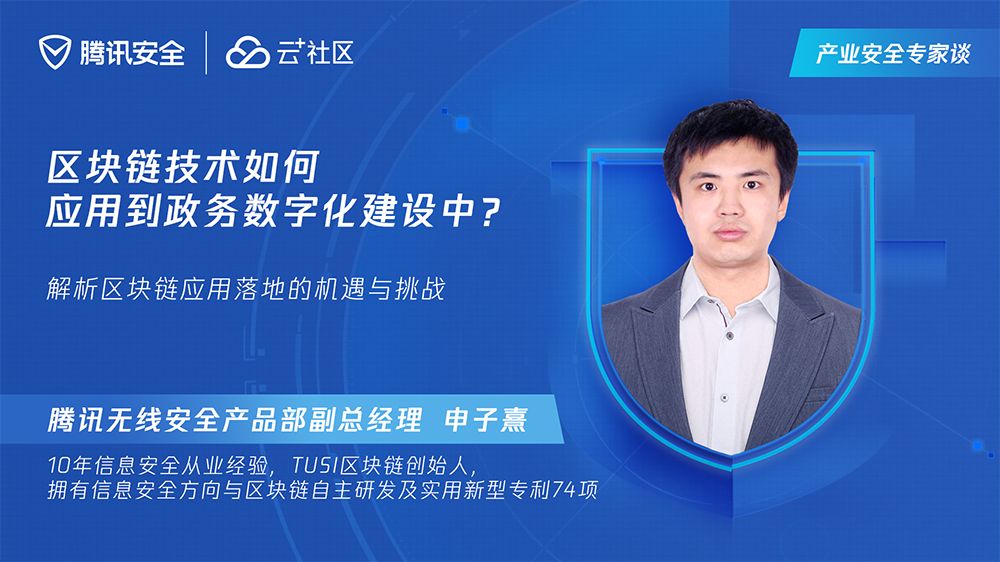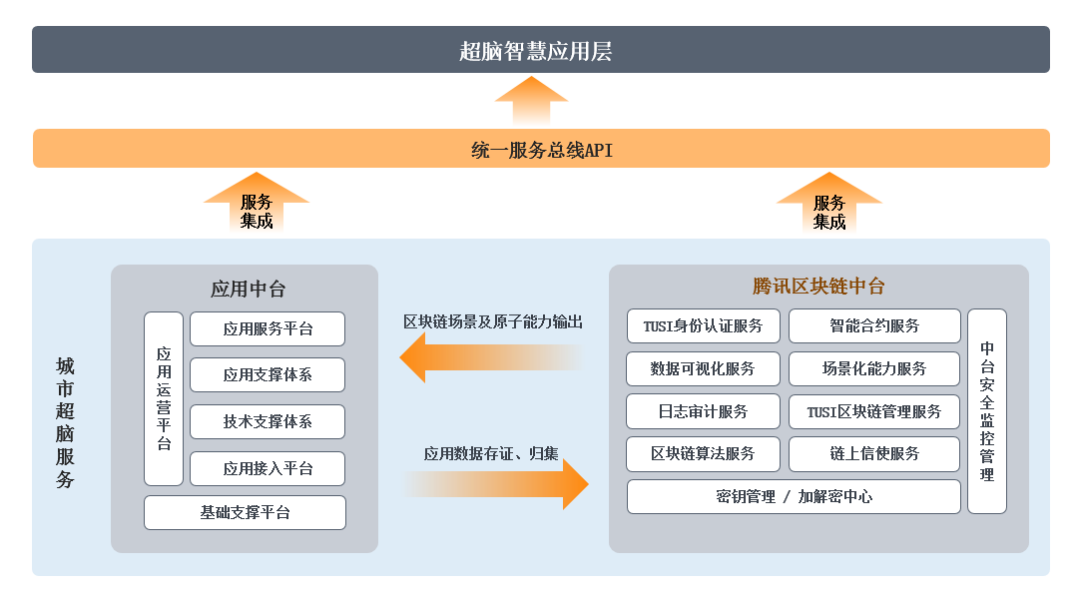Tencent Security Expert: How can blockchain technology be applied to digital construction of government affairs?
Source of this article: Tencent Security
Some people say that, compared with "coin speculation", "blockchain + industry" is like a clear stream. As the underlying technical guarantee for industrial assistance, blockchain technology has become "the torrent of the times."
It has been 10 years since the birth of blockchain technology, from digital financial blockchain 1.0 opened by Bitcoin to blockchain 2.0 represented by smart contracts. Nowadays, with the deepening of the industrial Internet, technology is used as a part of infrastructure In the way of technology + scene integration, the blockchain is gradually transitioned from a single scene to a multi-scenario landing, entering the era of industrial blockchain 3.0.
Blockchain can be deeply integrated into traditional industries. By integrating issues such as trust and automation encountered in the process of industrial upgrading, it can greatly enhance sharing and reconstruction to help traditional industries upgrade, reshape trust relationships, and improve industrial efficiency. Make up for the asymmetry of information between the financial and physical industries, realize the circulation of traditional industry values in the digital world, and help business flow, information flow, and capital flow reach the "three flows—", and then promote the digital transformation of traditional industries and build an industrial blockchain ecosystem .
- One Piece Online Teaching | Digital Asset Security Management Answers
- First in the country! Judicial Application of Judicial Blockchain Smart Contract Technology in E-commerce Dispute
- New York Times article: Pursue innovation or avoid responsibility? Social media giant's decentralization movement questioned

The "Industrial Security Expert Talk" created by Tencent Security and Cloud + Community ushered in the seventh issue today. The invited guests were the deputy general manager of Tencent's wireless security product department, the founder of Tencent's TUSI blockchain, and the head of the IoT security laboratory. Shen Zihuan. He has 10 years of experience in information security, has participated in the preparation of multiple security standards at home and abroad, has 74 independent research and development of information security directions, and has utility model patents. Currently he is mainly engaged in security research on the Internet of Things and blockchain.
Q : With the release of favorable national top-level design policies, blockchain has once again become the focus, but the actual landing scene of the market is not clear. How do you think about this?
Shen Ziyi: The blockchain has undergone two stages of development of digital tokens and the application of the financial industry, and has gradually landed in industries other than the financial industry, such as supply chain management, intelligent manufacturing, the Internet of Things, government affairs, people's livelihood, transportation and logistics, etc. There have been some excellent application cases.
The development of blockchain technology is a gradual process. The initial blockchain technology has bottlenecks in terms of stability and concurrency. With the technological breakthroughs in recent years, it has been able to meet the needs of some landing scenarios, such as the TUSI blockchain. It has been able to support TPS above 1W + stably, and can meet the performance requirements of most urban-level application scenarios.
With the favorable release of the national policy on the blockchain, more people will be driven to understand and use the blockchain technology, rather than being limited to speculation. In the future, blockchain applications will be implemented on a large scale throughout the industry.
Q: What problems and challenges do government and enterprises face when using blockchain to help the industry upgrade?
Shen Zizhen: From a business perspective, the original business is undergoing deep remodeling after combining blockchain technology, mainly including internal business process remodeling, government and market boundary remodeling, government and social boundary remodeling, and governance value system reconstruction. From a technical perspective, it mainly faces technical difficulties such as creating and managing blockchain networks, smart contract deployment, overall operations, and security.
The TUSI blockchain solution can assist government and enterprises to build a new model of industrial innovation and development based on the original business and combined with blockchain technology. At the same time, it can provide two methods of implementing the basic Taiwan platform services and the private deployment of government cloud. Technical difficulties in the application of blockchain technology in the government and enterprise fields.
Q: What scenarios does blockchain technology combine with in order to be able to play a substantial role in technical efficiency, thereby promoting industry innovation and development?
Shen Ziyi: From the perspective of the technical characteristics of the blockchain itself, its core functions mainly include machine trust, value transfer, and smart contracts. Around the blockchain landing scene, the industry has initially reached consensus on the application of the following scenarios, blockchain + information Sharing (Government Affairs, Medical, Credit Information, etc.), Blockchain + Attestation (Judicial, Intellectual Property, etc.), Blockchain + Logistics Chain, Blockchain + Finance (Supply Chain Finance), Blockchain + Payment (Across International settlement, electronic invoices), blockchain + digital assets (digital currency, digital gold), etc.
At present, the Tencent TUSI blockchain has been applied in credit cities, government data sharing exchanges, regulatory deposits and other scenarios. It establishes a trust system between business stakeholders through the blockchain consensus mechanism and non-tamperable features, thereby promoting business processes. Optimization and change.
Q: In the process of using blockchain technology to help the industry upgrade, what other issues need to be considered and solved?
Shen Zizhen: From a technical perspective, the underlying technology of the blockchain is still a large-scale application of the blockchain, especially core technologies such as security encryption, privacy protection, and consensus mechanism. In the selection of blockchain applications, various industries must comprehensively consider the safety, ease of use, and compatibility of the bottom chain. In the future, various industries will coexist with multiple chains, and there must be clear foresight of cross-chain, side-chain and other technologies. .
Data security: Deploy a secure computing environment on blockchain nodes, support single-point key management, and key protection sandboxes. When some sensitive data sources are synchronized on the chain, they can only be decrypted and used at specific nodes. All uploads and downloads All actions require blockchain audit supervision to ensure the privacy of data.
Data sharing: A node-based secure data encryption scheme that can encrypt data and protect data transmission lines. This protection network also provides opportunities for data sharing. The data between institutions can be confirmed by users. Realize authorization, so that data ease of use and right attributes reach an effective balance.
Q: Can I share the key points and suggestions on how blockchain can help the industrial upgrade in combination with the problems encountered in the industrial application of blockchain technology?
Shen Zizhen: In the process of landing the blockchain scene, there will still be some difficult points to balance. For example, in order to break the silo of government data islands, a data sharing scheme needs to be established. Due to the protection of data attribution, or the data is not updated in time, the commissions and offices are not willing to share the data, and the participation is not high. The blockchain solution can promote full mutual trust between government commissions and offices, data sharing on the chain, setting incentive mechanisms through smart contracts, and joining the supervision and evaluation incentives of commissions and offices to supervise data sharing.
In the process of industrial application of blockchain technology, it is necessary to study the nature of the problem and to objectively analyze whether the problem can be solved fundamentally in combination with the characteristics of the blockchain. The blockchain is not a "universal plaster", and it needs to be clear about the implementation of the scenario + technology. For example, high concurrency, large granular data transmission, large file transmission and sharing scenarios, data flows and business flows that are too complex, and time-sensitive application scenarios such as emergency command. Blockchain may not be able to bring about improvements in business efficiency, and it will also cause time And cost waste.
Q: Smart cities have also been the focus of development in recent years. As an emerging technology, what role can blockchain play in the construction of smart cities?
Shen Zizhen: Driven by the construction of smart cities, it has become a trend to explore blockchain data sharing models. For example, in the process of connecting government affairs big data, based on the blockchain consensus mechanism, it can realize the common maintenance and utilization of government affairs data across departments and regions, promote the collaborative processing of business, deepen the "up to one run" reform, and improve the user's government service experience.
Building smart city basic applications based on blockchain technology has been proven in multiple scenarios, including business processes and conventional systems in the fields of education, employment, pensions, precision poverty alleviation, medical health, commodity security, food safety, public welfare, social assistance, etc. Provide smarter, more convenient and better public services for the people.
In the construction of urban super brain, Tencent's TUSI Blockchain China-Taiwan brings together the basic capabilities and business capabilities of the blockchain technology to achieve business and Taiwan-China blockchain. For example, building a credit data sharing platform, by establishing data index assistance, confirming the data (including original sources, management rights, access rights, use rights, etc.) in credit data management to promote data circulation. It is output to the application platform in a service form, providing one-stop construction services, management services, and scenario capability services for the blockchain.

Q: What do you think of the prospects for the development and application of the blockchain industry? What are your expectations for the future?
Shen Zizhen: Blockchain has been born for 10 years. With the gradual improvement of infrastructure construction, the effective landing of technology and application scenarios has become an industry consensus. Only by seizing the opportunities of blockchain technology integration, function expansion, and industry segmentation can we maximize the zone's role in data sharing, optimizing business processes, reducing operating costs, improving collaboration efficiency, and building a trusted system. Blockchain industry helps value.
In the future, blockchain technology innovation and ecological development will be integrated faster into digital finance, the Internet of Things, intelligent manufacturing, supply chain management, digital asset trading, and government management, etc., and reduce the cost and efficiency of various business processes to achieve block Chain technology + scene deep integration.
We will continue to update Blocking; if you have any questions or suggestions, please contact us!
Was this article helpful?
93 out of 132 found this helpful
Related articles
- Hidden dangers behind the DeFi prosperity ecosystem and 2020 outlook
- Hong Kong's first trial virtual bank, Zhongan Bank, struck, using core technologies such as blockchain
- Ant Financial Services will change! New CEO: Blockchain is one of Ant Financial's fintech application chassis
- Year-end summary | 2020 panoramic view of the digital asset industry, these may be your most concerned
- Research: double spend is not worth it, Bitcoin transactions do not have to wait for 6 confirmations
- Babbitt Column | Stupid Protocol and Smart Terminal, Why Bitcoin's Simple Design Is Right
- European Central Bank's legal digital currency PoC first exposed, small transactions can be anonymous






